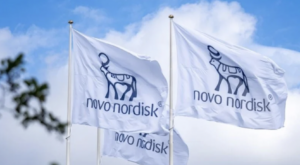How Novo Nordisk accidentally discovered the fat-busting drug Ozempic … creating a global craze, and making Novo the most valuable company in Europe.
September 18, 2023

Bagsværd is a 25 minute drive northwards from Copenhagen’s Kastrup airport.
When you arrive, there is nothing but Novo Nordisk. A sprawling campus of the Danish pharmaceutical giant that has grown rapidly over the years as a world leader in diabetes care.
Novo Nordisk was founded in 1923. Novo’s origins can be traced back to the collaboration of two Danish pharmacists, August Krogh and August Kongsted, who established Nordisk Insulinlaboratorium (Nordic Insulin Laboratory). Over the last century Novo has become primarily known for its work in the field of diabetes treatments. It develops and manufactures a wide range of diabetes medications, including insulin, as well as devices such as insulin pens and pumps.
This week Novo Nordisk’s miracle weight-loss drug Wegovy gained approval for use in the UK: for private patients and, on the NHS, for those with a BMI over 35 (or in exceptional case, over 30).
The Danish company’s market cap has dramatically risen to $428 billion, making it the largest company in Europe, overtaking the luxury goods giant LVMH, and bigger than the rest of Denmark’s annual GDP.
All because of an accidental discovery.
In 2017 its new drug for diabetics, Ozempic, was approved. But those taking it noticed their appetites seemed to disappear and they were losing weight. Ozempic contains semaglutide, which mimics a naturally occurring hormone, GLP-1, that makes us feel full after a meal, telling the body that no more food is needed.
Ozempic has transformed Novo, and potentially the future of millions of people too.
The market for weight loss drugs is estimated at $100 billion. Celebrities like Elon Musk have given it a go. In July 12 million units of Ozempic were sold. Yet demand far exceeds supply. Diabetes patients faced shortages because so many more people wanted to get their hands on Ozempic. An estimated 415 million people have type 2 diabetes worldwide. Over 1 billion people are obese.
Wegovy, which delivers a different dose of the same active ingredient, was created by Novo Nordisk in response to this stratospheric demand. The rapid growth has also come with concerns about side effects, particularly as the communication has spread virally, beyond the normal medical world. There are also ethical discussions about who deserves the limited supplies most.
Other pharma companies have woken up to the opportunity too. Eli Lilly and Pfizer have their own semaglutides. But the demand is so high, supply so short, that this should not damage Novo Nordisk any time soon. Indeed this could be just the beginning for semaglutides. They are also showing promising results when it comes to treating cardiovascular disease, chronic kidney disease and Alzheimer’s.
It sounds like a Hollywood movie, as an old and steady company suddenly discovers a wonder drug. How Novo can capitalise on the approach will be interesting.
The discovery reminds me of Viagra, another blockbuster drug, when the side-effects of another fairly routine drug development were realised to have huge applications in other areas. The brand Viagra was able to transform minds, business models, and sex lives. Of course there are few obese people in Denmark, but the small nation with a national GDP less than the market cap of Novo, is already feasting on one of its longest established companies.
Novo Nordisk also made it into TIME magazine’s most influential companies of 2023:
More from the blog